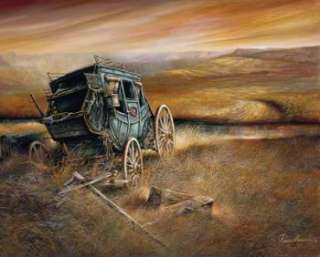|
|
| Stage lines began to replace saddle trains in 1864 as
soon as wagon roads were built. Stagecoaches were pulled by teams
of four or six horses. They carried passengers, mail and
"fast" freight. Much of the gold and silver from the
mines was shipped out by stagecoach. In fact, the stagecoach was
to be far more important west of the Mississippi River than east of it,
because in the West there were fewer navigable rivers and canals to
compete with land transport. Stagecoaches were the most important
means of travel in the west until the railroads were built.
Riding a stage was not always fun. The stage was noisy and bumpy, and the passengers were jammed together inside. It was an uncomfortable ride, and the rest stops were few and very poor. Stage stations were almost always dirty and smelly, and often the food was bad. Passengers suffered from dust and heat in the summer, mud in the spring and fall and snow and cold in the winter. There were always mosquitoes and rattlesnakes in warm weather. Sometimes stagecoaches were held up by bandits who robbed the passengers and stole the mail and gold if any was aboard. Stagecoach beginnings usually followed established trails in an effort to connect frontier settlements, or often forts, with established communities. A mail contract was indeispensable to such an operation, but there were also givernment express and passengers to be hauled. The key to the success of theses alone man-one horse operations was a contract to carry the U.S. Mail.
Stagecoach Etiquette Thanks to an old newspaper clipping, we know how we should have behaved if we’d taken a stagecoach in the old west. First, we were advised that the best seat inside the coach was behind the driver, riding backwards. Yes, some people got motion sickness, but if it didn’t bother you, this was the spot with “half the bumps and jars” of any other seat. Riders were admonished that if another passenger offered to trade seats, “don’t do it.” |
